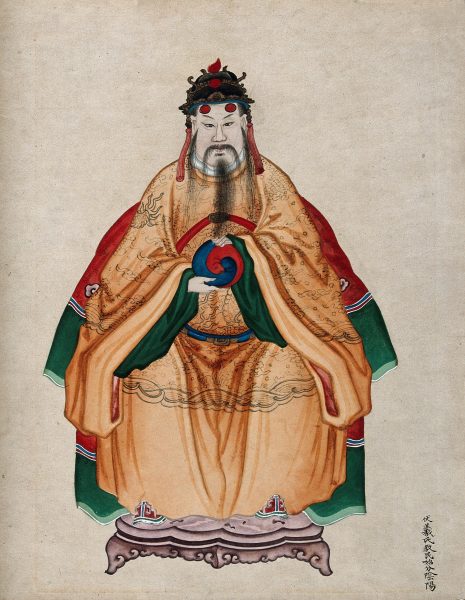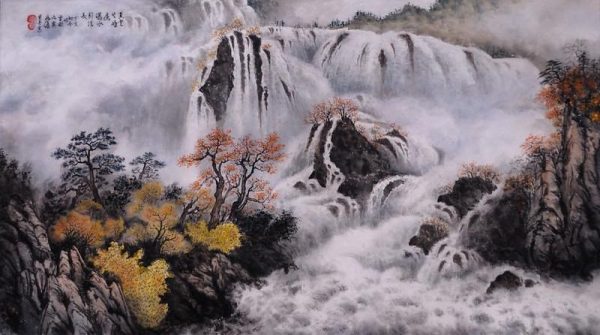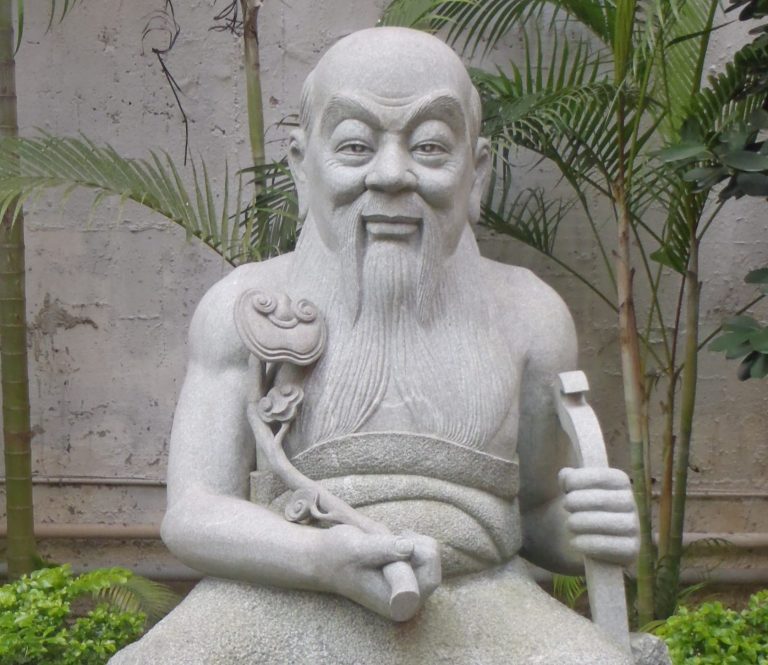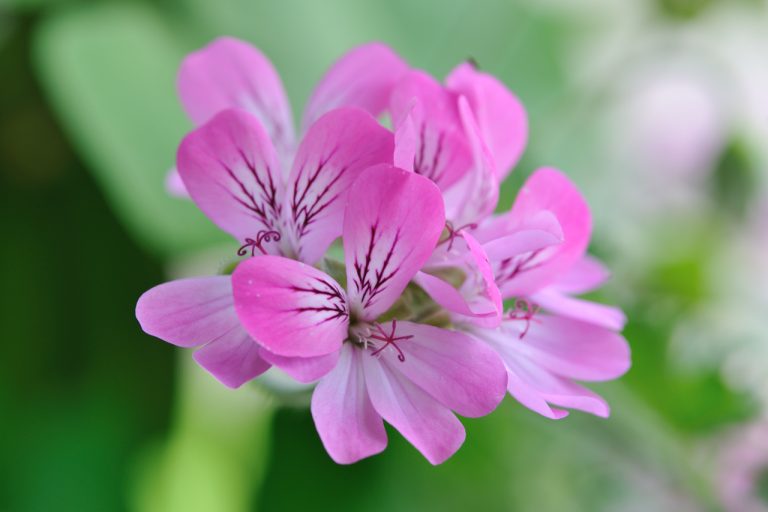Believing that Chinese culture was divinely bestowed on the Three Kings and Five Emperors (三皇五帝Sān huáng wǔ dì), Chinese people consider themselves to be the descendants of Emperors Yan and Huang (炎黃子孫 Yánhuáng zǐsūn). Ruling philosophies and realms evolved over time, moving from the ancient Sovereigns to Emperors and then Kings.
Sovereigns (皇 Huáng)
Sovereigns are said to be demigods. They governed based on their profound insight into the all-embracing laws of heaven (The Heavenly Way). They understood the harmonic balance of yin and yang, the rotation of the four seasons, and how man is one with Heaven and Earth. According to historical records, it was the Sovereigns who helped introduce the use of fire, taught people to build houses, and developed agriculture.
In the period of the Three Sovereigns (三皇 Sān Huáng), people lived in caves, wore animal furs, and drank from mountain springs. They were carefree and without desires. Treasures like gold, pearls, and jade were left in the wild. There were no rules nor punishment. People interacted simply and naturally with the spirit of Heaven and Earth.
The Sovereigns ruled according to the Heavenly Way. There was no need to consider virtue because everything everywhere existed equally without artificial distinctions. The path was simple and smooth, and there was beauty beyond words when people followed the Heavenly Way.
Confucius said, “What does Heaven say? …The four seasons are in motion, and all things are born.” Heaven uses unspoken words as a profound and far-reaching lesson to man and all beings. Because Heaven had presented the best of everything to the world, everything was born in accordance with its nature, and people grew in accordance with their nature. They enjoyed the feast of Heaven in peace and tranquility, without desire.

Emperors (帝Dì)
Success
You are now signed up for our newsletter
Success
Check your email to complete sign up
Secondary to Sovereigns were Emperors, who governed based on morality. With the people as subjects, distinctions were drawn. Emperors still embraced the Heavenly Way but added the concepts of virtue and the world. Although this realm did not yet have thoughts of owning the world or divisions by dynasties, it had already become less lofty and more limited than the rule of Sovereigns.
Man obtained the Laws of Heaven to guide his behavior. Virtue, (德, de) a homophone of “obtain” in Chinese, is something one gets through adhering to these laws. Humans are the only beings capable of acquiring virtue, and only they can appreciate it and restrain their desires in favor of it.
The higher one’s moral level, the deeper his or her understanding and insight. When people are able to grasp the fundamental nature of things, they are better able to handle difficult situations and navigate life’s challenges. When people are burdened with desires and concerns, they find it difficult to accomplish things.
During the period of the Emperor’s governance, people no longer followed the Law of Heaven directly. Instead, they followed the “Law of the Saints,” which meant that they applied the saints’ understanding of Heaven’s laws to guide their behavior.
Virtue prevailed, but a basic system of rules was established to enforce it, with mandatory and firm punishment. There emerged good and bad, and the Yellow Emperor’s soldiers were conquering the land using force. This was a much smaller realm than the universally selfless and spontaneous law of heaven. Therefore, Laozi described it as “losing the Way then developing virtue.”
Kings (王, Wáng)
Kings generally referred to as “sons of Heaven,” followed the emperors. The three horizontal lines of the character 王 (Wáng) represent the Way of Heaven, the Way of Earth, and the Way of Mankind. The vertical line down the middle represents the unity of the three. Said to be ordained by heaven as owners of the world, kings exercise the authority of governing the people for heaven.
The Way of Kings is benevolent, aiming toward fulfillment of all things and harmony for all people; and righteous, demonstrating reason, truth, and justice. While Sovereigns’ and Emperors’ rule was self-evident due to their behavior being in accordance with Heaven’s Way, a king must demonstrate somehow that he is chosen by Heaven. Only after receiving Heaven’s approval, can he govern the people with the king’s way, rewarding good and punishing evil.
Such was the magnitude and breadth of mind of ancient Chinese leaders who stood at the top of the social hierarchy. Unlike today’s politicians, they embraced heaven and earth, taking in everything.
Recalling traditional ways to restore human morality
In the era of sovereigns, emperors, and kings, people were grounded in morality. Their insight into unraveling the mysteries of nature is incomprehensible to modern minds. When today’s people look at ancient societies from the perspective of modern science and the theory of evolution, they regard their lack of technology and scientific knowledge as ignorance. This is due to their own wisdom being insufficient.
The myths and legends passed through the 5000 years of Chinese history are a reflection of the people of that time. Since one’s rule was determined by his level of mastery of the laws of heaven, it was necessary for those who governed to have the ability to freely sense, communicate, and integrate with the energy field of the universe. Only those with the highest level of moral sophistication could become sovereigns, emperors, or kings, as only they could exhibit the state of unity between heaven and man.

Over time, the nature of divinely-inspired ancient rulers became misunderstood by their human descendants whose moral standard continued to decline. With man’s increasing scientific knowledge, he has developed a never-ending pursuit of controlling nature and accumulating worldly possessions. Since his innate instincts to communicate with Heaven and Earth have been degraded and lost, people regard their ancestral moral exemplars as merely myths and legends.
Sages like Lao Tzu and Confucius both advocated retrospection. Daoist Lao Tzu proposed a path for reverting back to the basics, which he called “return to the innocence of infants,” while Confucianism holds that one should use the historic past to evaluate people and events. They both saw that only by going back could man reverse the downward trajectory of “progress” and escape extinction.
People are often reminded not to forget their roots, to break free from the shackles of temptation and desire, and to behave in a moral and upright manner. This is advice that will enable them to return to the path that is aligned with Heaven and Earth.















